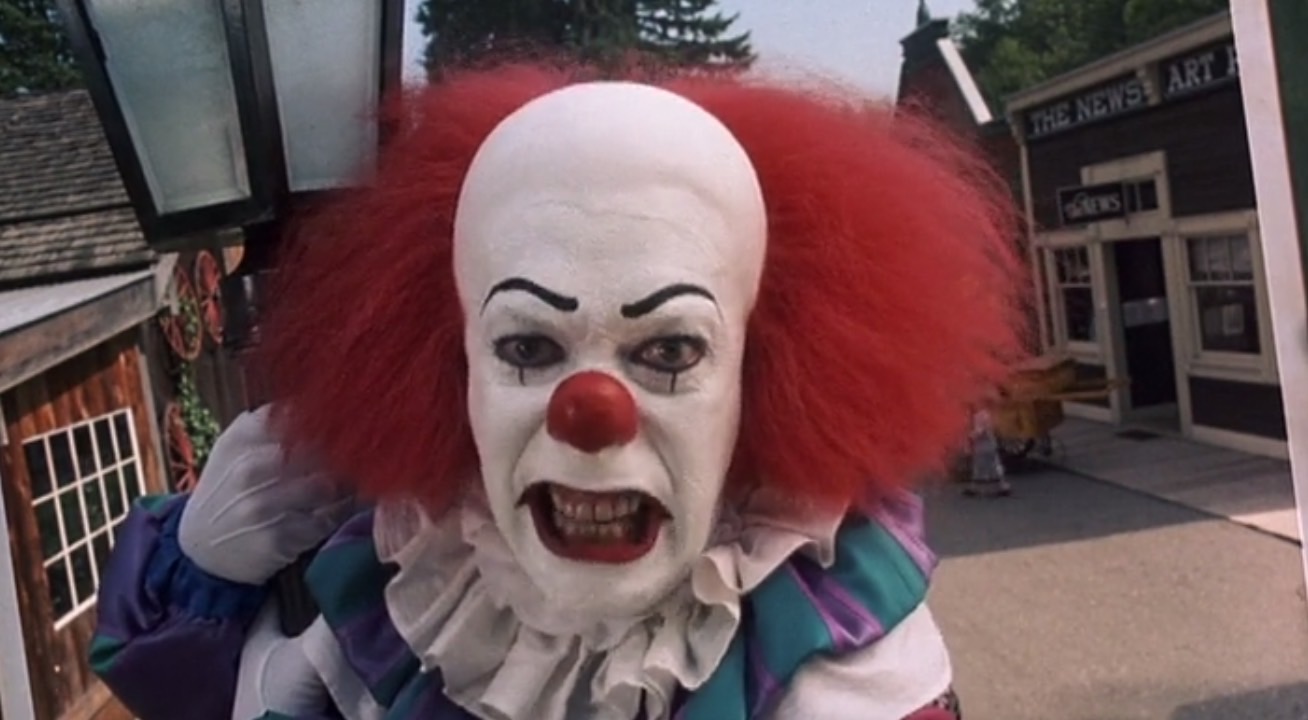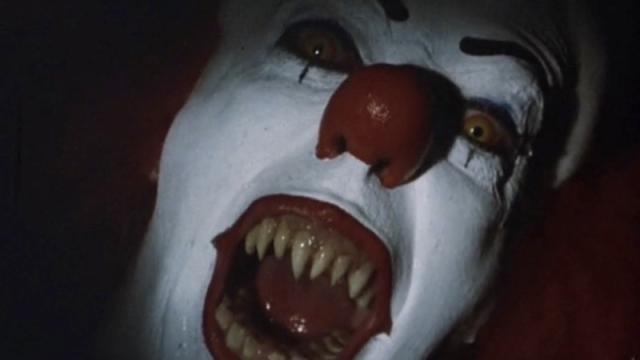If you’re a horror fan, you know that Stephen King’s It is being adapted for the big screen — and you likely still have some lingering trauma from watching the 1990 TV adaptation. Those memories aren’t unfounded: The It miniseries is still disturbing as hell. What’s surprising is that it’s not just because of that clown.
All images via screengrab
The miniseries puts Pennywise — expertly played by Tim Curry with flamboyant menace — front and centre; he makes his first appearance in the first three minutes of episode one. Within seconds, he’s killed the freckle-faced moppet whose tricycle ride backgrounds the opening credits. When he’s not committing murder outright, the clown’s other terror tactics include creating repulsive hallucinations that exploit the fears of the main characters. And he just looks petrifying — a circus escapee whose eyes change colour and whose teeth shape-shift from pearly whites to razor-sharp yellow points. He’s the worst of everything you could ever fear about clowns, and/or hideous monsters masquerading as clowns.
But Pennywise isn’t the only boogeyman in Derry, Maine — though admittedly, his presence exacerbates, and maybe even causes, the non-supernatural evils that lurk in the town. Since this is a King story, there has to be a bully, and teen greaser Henry Bowers metes out nearly as many nightmares as Pennywise to It‘s young protagonists, who call themselves the Losers’ Club.
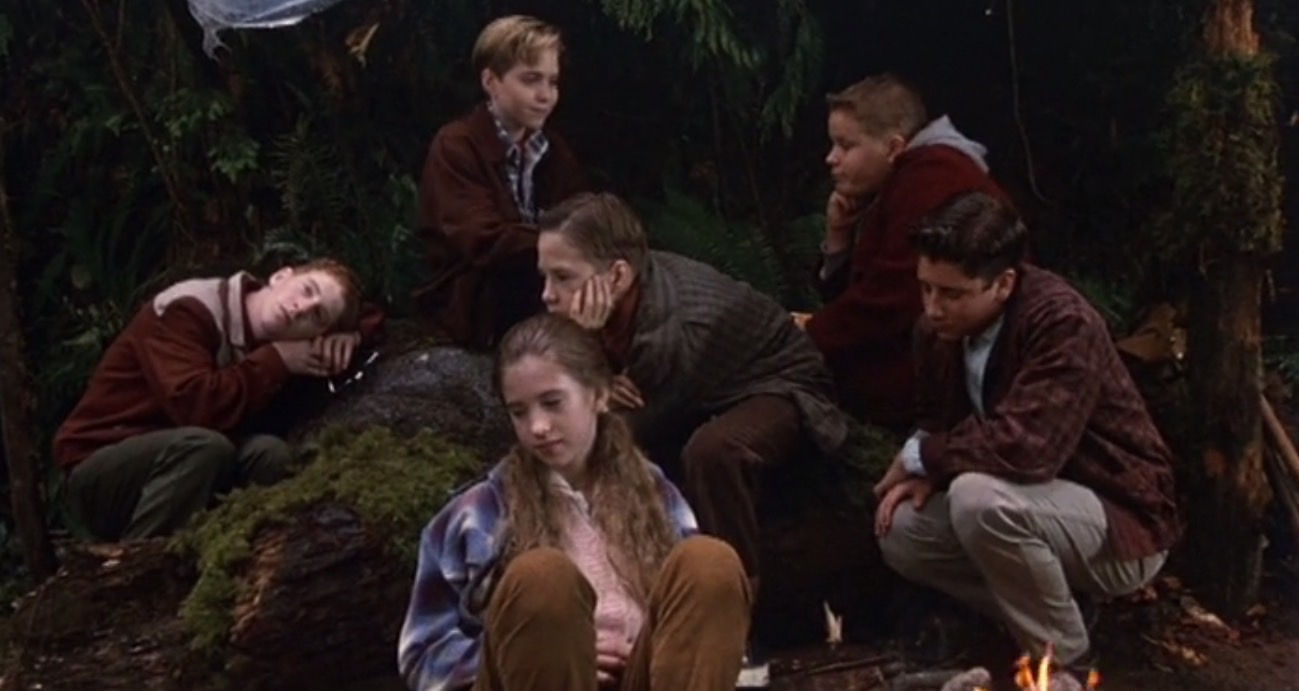
Henry’s eagerness to escalate schoolyard threats into actual violence makes even his own punky friends uneasy, and none of the grown-ups in Derry care to intervene, aside from exasperated detention sessions assigned by the kids’ teacher. The only adult who sort of sticks his neck out is Derry’s (sole?) police officer, who delivers a stern warning to the Losers that they shouldn’t go anywhere alone, on account of all the murdered kids. They’re already way ahead of him on that tip, of course.
Their parents (at least the ones the miniseries has time to introduce) are also no help. The only girl Loser, Beverly — who is, incidentally, bullied not just by Henry but by the Mean Girls in her class — has an abusive father. Pipsqueak Eddie’s mother convinces her healthy son that he has asthma. Losers’ Club leader Bill’s parents are emotionally MIA after Pennywise kills Bill’s younger brother.
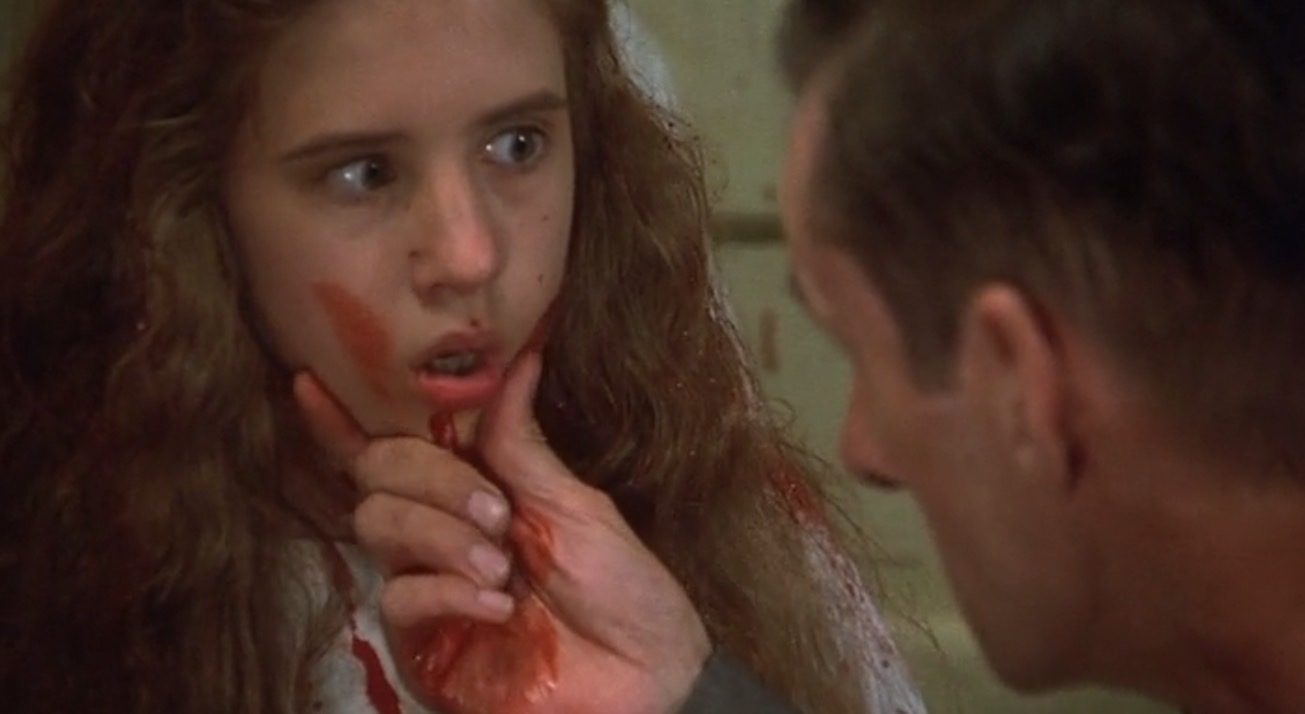
The only cool mum in the group is Ben’s widowed mother, but she’s undermined by her bitchy sister, who grudgingly provides them a place to stay when they move to Derry. For all the kids, hanging out at home is grim, while school is Henry’s prime turf. Pennywise, of course, can strike literally anywhere, and his pranks go unnoticed by any authority figures.
Once the Losers grow up, most of them become amazingly successful. But none of them are happy. Fashion designer Beverly has a boyfriend who’s just as controlling and cruel as her father; Bill (the King stand-in) is a successful horror author with a gorgeous wife but is also a miserable workaholic; comedian Richie has a shifty, overly critical manager who overworks him and is probably on the take; and so on, down the line. The only Loser who didn’t leave Derry, Mike, is the only one who remembers Pennywise (thanks to the post-traumatic brain fog shared by the others), and the mental burden is tremendous.
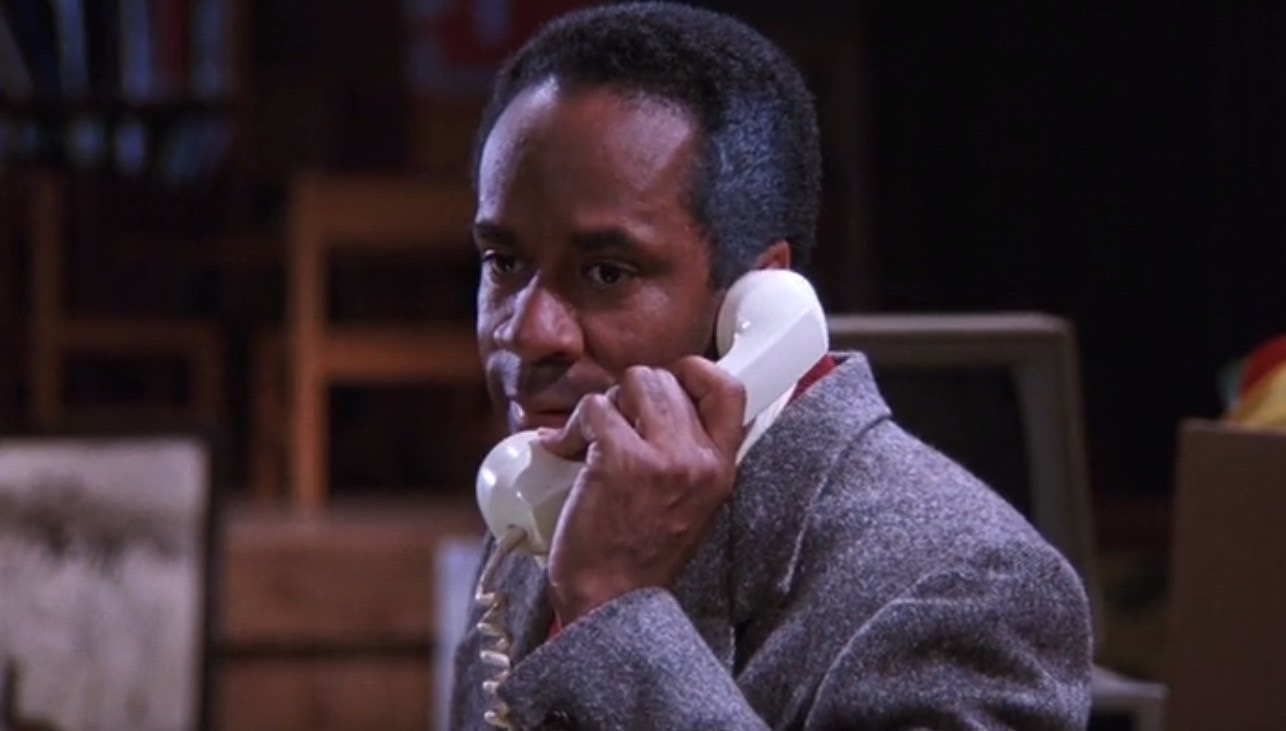
It’s always bad news for Mike.
In contrast to King adaptation Stand By Me, which is a similar coming-of-age-tale but without any supernatural elements, there are precious few moments of levity in It. The miniseries runs just over three hours and it’s tears, terror and dread almost the entire time. It’s draining, especially when viewed without commercial breaks. You might feel ill when Bev returns to her childhood home, only to find her hated father has been replaced by something even worse (hint: Clown). Your skin might crawl during the Chinese restaurant scene, in which the adult Losers are confronted with the grossest fortune cookies ever.
You even might find yourself making this face, in the manner of the wife of Losers’ Club member Stan, when she realises he’s killed himself rather than face Pennywise again:
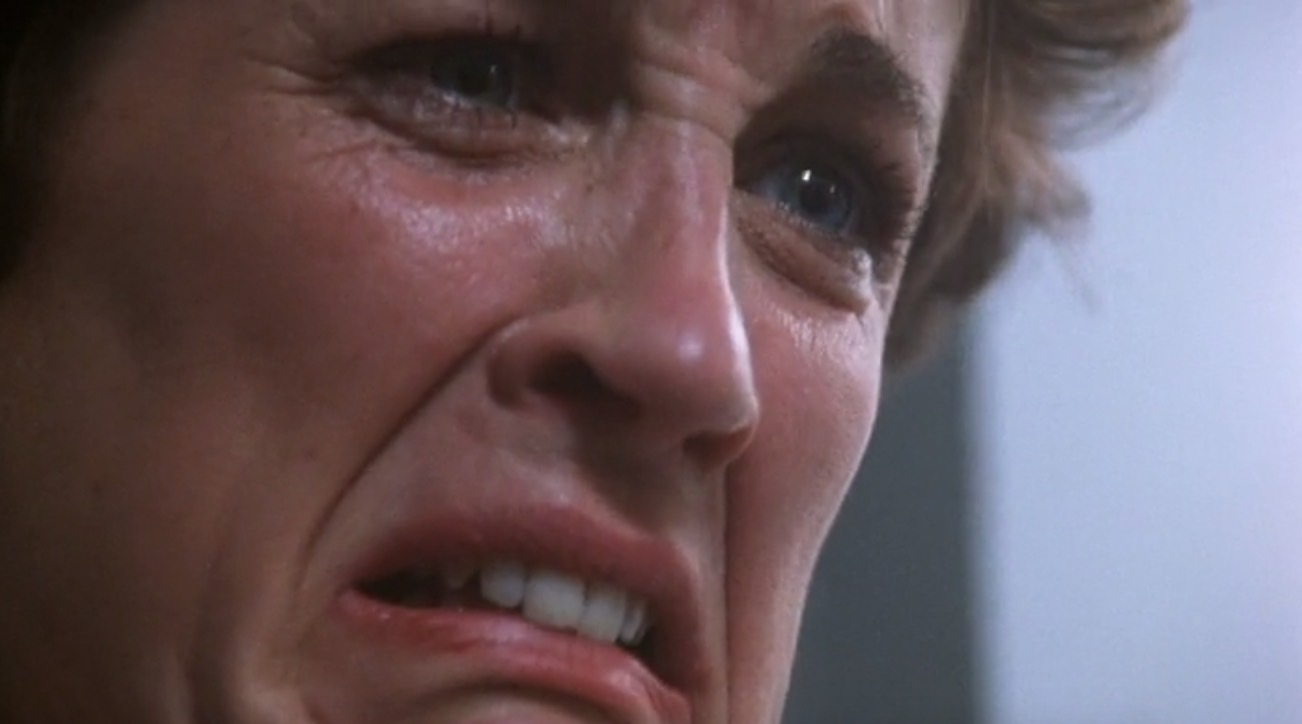
(Poor Stan’s head, of course, soon pops up in a refrigerator back in Derry to taunt the Losers.)
It is frequently unpleasant and distressing; props to America’s ABC, which also debuted Twin Peaks that same year, for airing a gory bummer of a movie about child murders and psychological torture. But it’s also undeniably enthralling. The cast is fantastic (aside from Tim Curry, it includes John Ritter, Harry Anderson, Annette O’Toole, a distractingly ponytailed Richard Thomas, Olivia Hussey and a very young Seth Green), and the direction is by Tommy Lee Wallace, who worked on several of John Carpenter’s early films (he also directed Halloween III: Season of the Witch). Even the score is eerily memorable.
The 1990 It‘s biggest change from the novel is probably its exclusion of its most controversial moment, in which all of the young Losers have sex with Beverly after fighting the monster, as a way to bring them all together. (Yeah… it’s baffling even in context.) The new version is being structured as two feature films, which will presumably allow it even more screen time to explore King’s story. If it’s rated R, its scare tactics might be even more brutal, and it will no doubt make good use of CGI to convey its horrors.
But the original It‘s low-fi frights still more stand up, mostly thanks to Curry. Because holy crap is he terrifying as Pennywise… then, now and forever.
